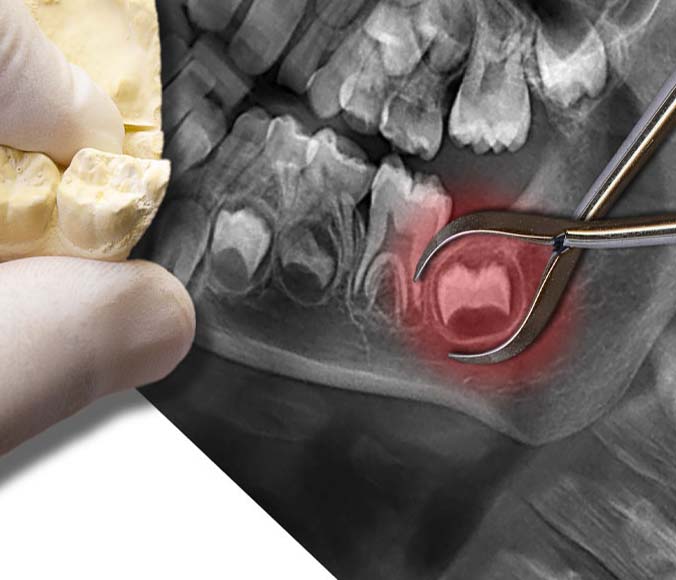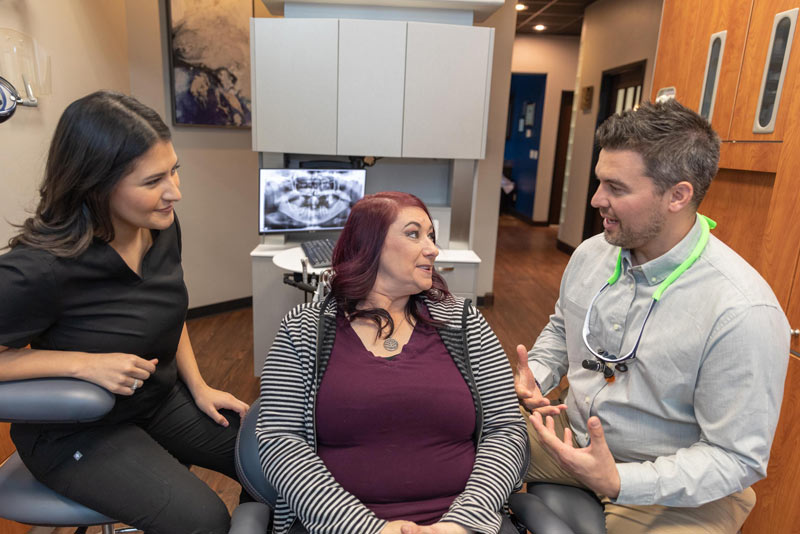EXTRACTIONS PROVIDE RELIABLE RELIEF
Sometimes a rotten tooth or a broken tooth can be fixed with a filling, a new crown, or both. Dr. Joseph Fleming’s priority is to try to save a natural tooth whenever possible. Sometimes a tooth is too damaged or decayed to respond to treatment and must be removed. When this happens, count on his steady, skilled hands and anesthesia options to keep you comfortable throughout the procedure. Always choose Spear Education-trained Dr. Fleming for gentle, precise tooth extractions in Oklahoma City, OK.


WHY YOU MAY NEED TOOTH EXTRACTIONS
- Rotten tooth
- Broken tooth
- Damaged tooth
- Impacted wisdom teeth
- Tooth overcrowding
- Gum disease
- Dental implant placement
TYPES OF TOOTH EXTRACTIONS
Before removing your untreatable tooth or teeth, Dr. Fleming administers nitrous oxide (“laughing gas”) and/or local anesthetic, which will keep you alert but calm during the extraction. To remove the tooth, he uses a pair of forceps, gripping the tooth and carefully pulling it free from the socket. After this, any tooth pain connected with the infection or damage should soon subside. That doesn’t mean you should consider that the end of your treatment, however. After you’ve had a tooth pulled, you’ll have an unattractive gap in your smile that can continue to make eating and speaking difficult, even when the infection is gone. Worse still, that empty socket can cause your jawbone to recede. Regain full, comfortable tooth function and your self-esteem—while protecting your jawbone and greater dental health. Dental implants provide all those benefits and can often be placed the same day as an extraction! Dr. Fleming can also rebuild your jawbone with bone grafting, if needed. Turn tooth loss into an opportunity for something better—a higher quality of life!
Wisdom teeth generally erupt starting in the late teens. If they fail to break through the gums fully or don’t erupt at all, they’re called impacted. Wisdom teeth can compromise the healthy teeth in your mouth by putting pressure on them and causing them to grow crooked. Wisdom teeth are also notoriously difficult to clean, which makes them more likely to develop infections. Wisdom teeth extractions are more complex than general extractions, with Dr. Fleming opening up your gum tissue and taking the problematic teeth out whole or in pieces. This is why some other general dentists never attempt them. Wisdom teeth never need to be replaced, so once they’re gone and you’ve healed, you’ll never have to deal with them again.

ENSURE SMOOTH POST-EXTRACTION HEALING
After any tooth extraction, it’s critical that you take special steps to ensure the healing process goes as it should. A blood clot typically forms over an empty tooth socket during healing. If this doesn’t happen or if the blood clot fails, the bone and nerves below the socket become exposed. This results in a painful complication called dry socket. You can prevent dry socket and avoid unnecessary suffering by closely following all of the post-extraction guidelines Dr. Fleming provides!
Location
New Patients:
Current Patients:
Address:
- 13316 S Western Ave Suite #B, Oklahoma City, OK 73170
Hours
- Monday: 8am - 5pm
- Tuesday: 8am - 5pm
- Wednesday: 8am - 5pm
- Thursday: 8am - 5pm
- Friday: 8am - 5pm
- © 2022 Fleming Dental Co, All Rights Reserved.

